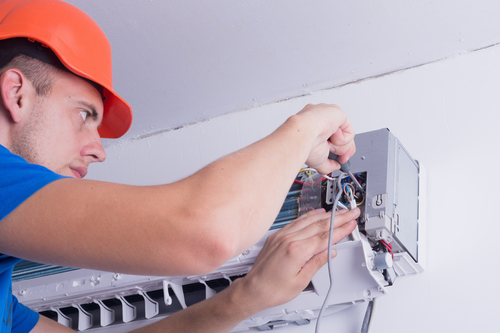Most of us understand that the compressor in our air conditioner is essential, but not as many people understand why that is. You may have heard stories about how much it costs to replace your compressor, but perhaps you’ve thought to yourself: “That doesn’t help. How do I know if my AC compressor is bad in the first place?”
Here’s the thing: the more you learn about your compressor, the better you’ll be able to care for it and make sure that it stays safe while you operate your HVAC. Keeping your compressor in good condition is more than vital to the efficiency of your system. Without a functioning compressor, your AC would not be able to cool your home at all. That’s because the compressor’s function is to convert your refrigerant from liquid to gas and back again—a chemical reaction that either uses or produces heat. As such, the compressor is directly responsible for the ability of your air conditioner (or heat pump) to change the temperature of the air that flows through your building.
Because your compressor plays such a vital role in your HVAC, it pays to learn the signs of an unhealthy or failing compressor so that you can address the situation. Learning to identify a compressor problem early can help you nip the problem in the bud before it gets worse, or at least let you budget for the necessary repairs ahead of time.
How Do I Know if My AC Compressor Is Bad? Look for These Signs:
 Compressor problems don’t just appear out of nowhere. In fact, they may be heralded by several signs. Any of the following irregularities can indicate a compressor problem, so make sure you keep an eye out for them and call a professional if they present themselves.
Compressor problems don’t just appear out of nowhere. In fact, they may be heralded by several signs. Any of the following irregularities can indicate a compressor problem, so make sure you keep an eye out for them and call a professional if they present themselves.
- Odd noises are emanating from the indoor unit. Noises that sound out of place are very often a sign of compressor trouble and should be taken very seriously. It is always best to call a professional for help in such circumstances since they will be able to confirm the source of the noise and identify it accurately. However, you may be able to ascertain some clues from paying attention to the kind of sound that you are hearing. If the noise that you hear is a rattle that occurs when you first turn on the system, it could indicate a problem with your electrical relay switch. Electrical relay switch problems may precede compressor failure, so if this is occurring in your system you should stop using it immediately and call for a technician. If the noise is closer to a kind of rumble that takes place when it is already up and running, your compressor’s motor may have come loose and started bumping around inside your HVAC. While a loose motor can be reattached, it should still be handled by a professional, and you should not use the system until taking care of it.
- Inexplicably bad airflow. There are several possible explanations for poor airflow, but if your system is unable to circulate air through your home for any reason efficiently, then it can put your compressor at risk. Poor airflow in your HVAC means your system has to do extra work to achieve results. That work can put a strain on your system, which often results in core components wearing out long before their time. Airflow problems are typically caused by blocked ducts, obstructions around the outdoor unit, and neglected air filters. Keeping your system serviced regularly and taking care of routine maintenance can prevent these problems from costing you an otherwise good compressor. However, if none of these issues account for the low flow of air throughout your system, your compressor may be old and unable to produce reasonable amounts of cold air. If you have recently had your ducts cleaned and your filters changed, deficient airflow can indicate a compressor that is about to fail.
- Diminished cooling abilities. Sometimes a weak compressor fails to produce a significant volume of cool air, but sometimes the problem isn’t volume. Occasionally, a faulty compressor can circulate plenty of air but fail to cool it adequately. If your system is not cooling the building the way it used to, check your thermostat settings and your insulation to make sure the temperature change is not caused by something else. If the source of the problem is not apparent, it could very well be the result of a defective compressor.
- Leaking refrigerant. A little water collecting around your indoor unit as a result of condensation is perfectly natural, but leaking refrigerant is another matter entirely. If you see refrigerant pooling anywhere near your system, there is a very good chance that your compressor is damaged. Stop using the system and avoid contact with the refrigerant.
Once you’ve answered the question, “how do I know if my AC compressor is bad?”, you’ll need to answer another one: “What do I do about it?” In most cases, there’s only one solution: call a professional for damage control and replacement. Licensed professionals will be able to help you repair and restore your system most cost-effectively. Be sure to call one as soon as you notice signs of compressor trouble so that they can mitigate the potential consequences.
Check with us here at Valley Comfort Heating and Air, our customers love our attention to detail and our friendly, affordable service. (707) 539-4533

